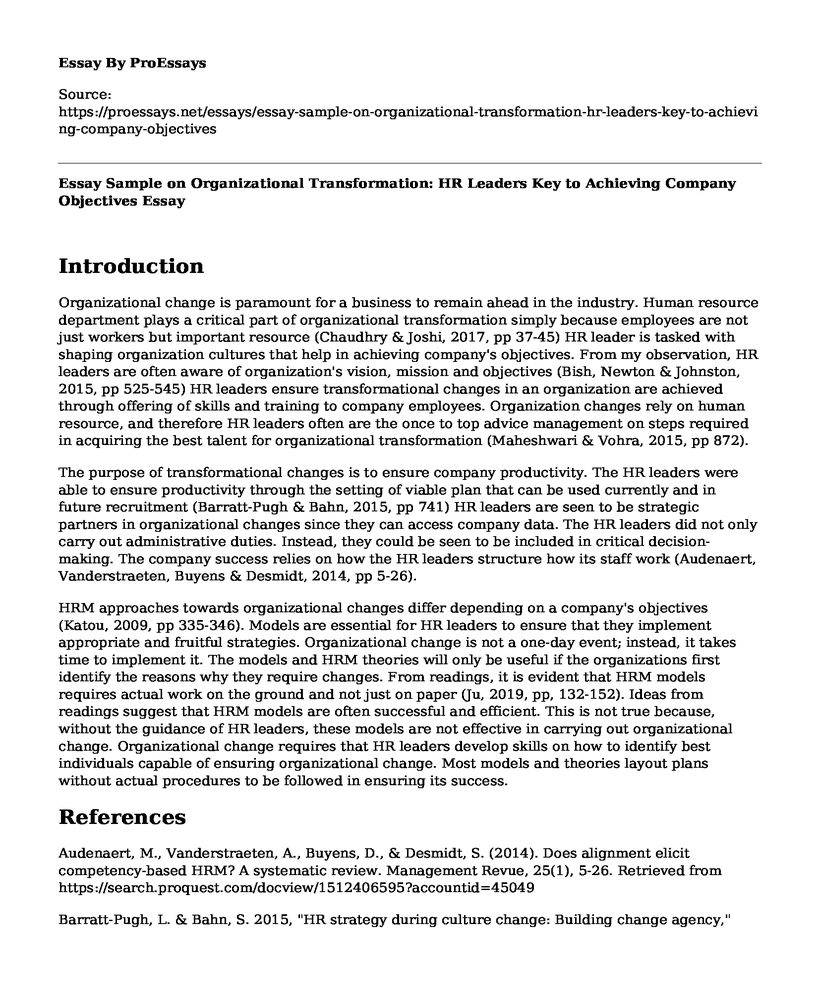Introduction
Organizational change is paramount for a business to remain ahead in the industry. Human resource department plays a critical part of organizational transformation simply because employees are not just workers but important resource (Chaudhry & Joshi, 2017, pp 37-45) HR leader is tasked with shaping organization cultures that help in achieving company's objectives. From my observation, HR leaders are often aware of organization's vision, mission and objectives (Bish, Newton & Johnston, 2015, pp 525-545) HR leaders ensure transformational changes in an organization are achieved through offering of skills and training to company employees. Organization changes rely on human resource, and therefore HR leaders often are the once to top advice management on steps required in acquiring the best talent for organizational transformation (Maheshwari & Vohra, 2015, pp 872).
The purpose of transformational changes is to ensure company productivity. The HR leaders were able to ensure productivity through the setting of viable plan that can be used currently and in future recruitment (Barratt-Pugh & Bahn, 2015, pp 741) HR leaders are seen to be strategic partners in organizational changes since they can access company data. The HR leaders did not only carry out administrative duties. Instead, they could be seen to be included in critical decision-making. The company success relies on how the HR leaders structure how its staff work (Audenaert, Vanderstraeten, Buyens & Desmidt, 2014, pp 5-26).
HRM approaches towards organizational changes differ depending on a company's objectives (Katou, 2009, pp 335-346). Models are essential for HR leaders to ensure that they implement appropriate and fruitful strategies. Organizational change is not a one-day event; instead, it takes time to implement it. The models and HRM theories will only be useful if the organizations first identify the reasons why they require changes. From readings, it is evident that HRM models requires actual work on the ground and not just on paper (Ju, 2019, pp, 132-152). Ideas from readings suggest that HRM models are often successful and efficient. This is not true because, without the guidance of HR leaders, these models are not effective in carrying out organizational change. Organizational change requires that HR leaders develop skills on how to identify best individuals capable of ensuring organizational change. Most models and theories layout plans without actual procedures to be followed in ensuring its success.
References
Audenaert, M., Vanderstraeten, A., Buyens, D., & Desmidt, S. (2014). Does alignment elicit competency-based HRM? A systematic review. Management Revue, 25(1), 5-26. Retrieved from https://search.proquest.com/docview/1512406595?accountid=45049
Barratt-Pugh, L. & Bahn, S. 2015, "HR strategy during culture change: Building change agency," Journal of Management and Organization, vol. 21, no. 6, pp. 741-754.
Bish, A., Newton, C. & Johnston, K. 2015, "Leader vision and diffusion of HR policy during change," Journal of Organizational Change Management, vol. 28, no. 4, pp. 529-545.
Chaudhry, S., & Joshi, C. (2017). Transformational leadership, HR practices and affective commitment to change: A theoretical perspective. Journal of Organisation and Human Behaviour, 6(3), 37-45. Retrieved from https://search.proquest.com/docview/1948234006?accountid=45049
Ju, B. 2019, "The roles of the psychology, systems and economic theories in human resource development," European Journal of Training and Development, vol. 43, no. 1, pp. 132-152.
Katou, A.A. 2009, "The Impact of Human Resource Development on Organisational Performance: Test of a Causal Model," Journal of Behavioral and Applied Management, vol. 10, no. 3, pp. 335-356.
Maheshwari, S. & Vohra, V. 2015, "Identifying critical HR practices impacting employee perception and commitment during organizational change," Journal of Organizational Change Management, vol. 28, no. 5, pp. 872-894.
Cite this page
Essay Sample on Organizational Transformation: HR Leaders Key to Achieving Company Objectives. (2023, Jan 11). Retrieved from https://proessays.net/essays/essay-sample-on-organizational-transformation-hr-leaders-key-to-achieving-company-objectives
If you are the original author of this essay and no longer wish to have it published on the ProEssays website, please click below to request its removal:
- Essay Sample on Professionalism in School and Workplace
- Change Management - Paper Example
- Essay on Organizations as Complex Systems
- Current IT-Related Ethical Issues Essay Example
- Tim Hortons Company Analysis Paper Example
- Essay Sample on Tech Workshop: A Reflection on Group Learning & Self-Development
- Essay Example on Developers' Plumbing Needs: Aqualisa Quartz's ShowerMax Product







